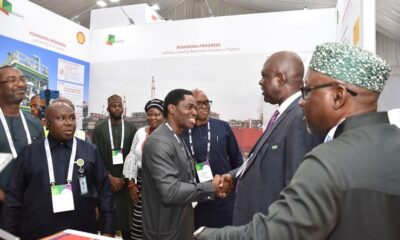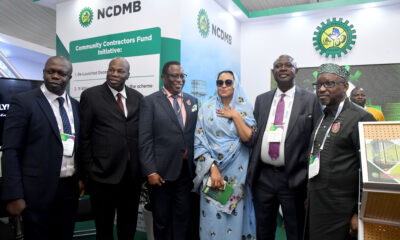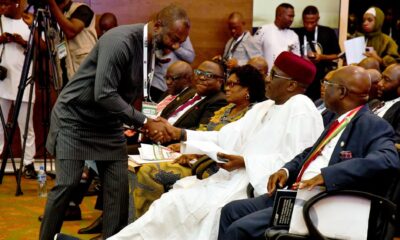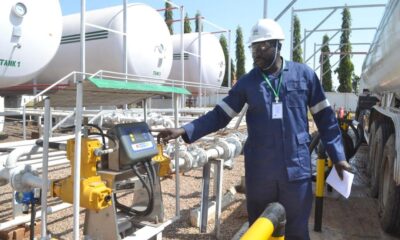Energy
Research Imperatives: NCDMB Hosts Oil Industry Players, Academia
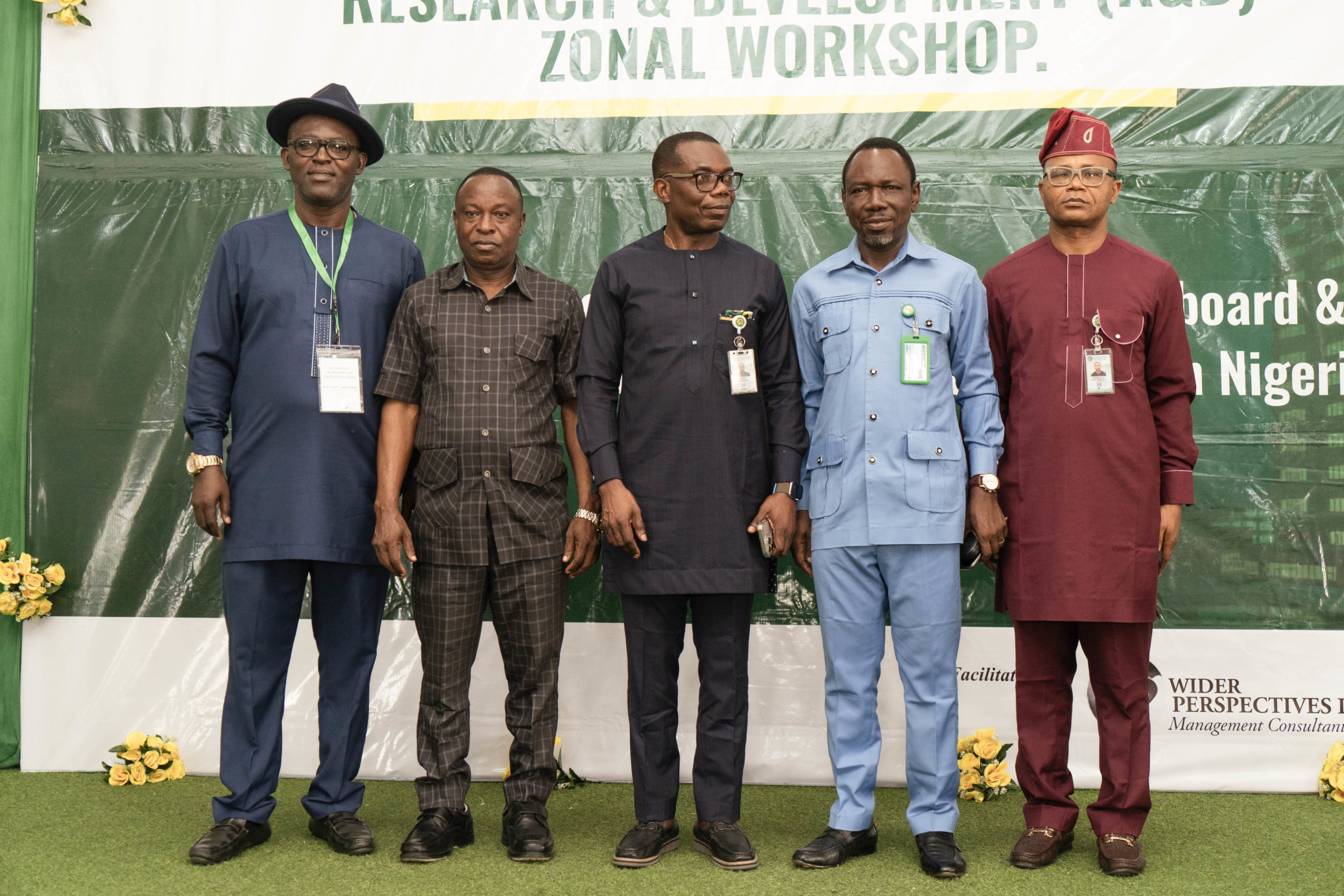
Top Oil and Gas Industry stakeholders are together with leading academics in three-day Research and Development (R&D) workshop on with special focus on needs-driven research, deepening collaboration and linkages.
The zonal workshop, which commenced on Tuesday, sponsored by the Nigerian Content Development and Monitoring Board (NCDMB) is holding at the Niger Delta University (NDU), Amassoma.
The Corporate Communications Department of the NCDMB made the disclosure in a statement on Wednesday.
Biztellers reports that the workshop provides a forum for discussions and demonstration of research breakthroughs on software and hardware as they relate to oil and gas industry needs, bioremediation and related oil field chemicals solutions, including additives and drilling fluids, and renewable solutions to meet industry needs.
Scheduled to be hosted in the six geopolitical zones of the country by NCDMB Centres of Excellence in six universities, the workshop is also intended to enhance capacity building of research directors and lecturers, particularly in writing and reading compelling research proposals.
In a keynote address at the Workshop, the Executive Secretary of the NCDMB, Engr. Felix Omatsola Ogbe, said the Board was empowered by Sections 36-39 and 70 (m) of the Nigerian Oil and Gas Industry Content Development (NOGICD) Act, 2010, to “coordinate and superintend over research and development towards the further attainment of the goal of developing Nigerian content in the Nigerian oil and gas industry.”
According to him, “critical gaps hampering the research climate in our sector,” notably, “lack of research infrastructure, funding and weak commercial frameworks,” had been identified in the Board’s 10-Year Strategic Road Map, which had been developed in 2017. Appropriate measures to close such gaps were also identified.
He noted that “the establishment of Research Centres of Excellence in the six geopolitical zones of the country and establishment of the R&D Fund to stimulate research in the oil and gas sector” were some of the measures recommended to remedy the identified gaps. The Nigerian Content Research and Development Fund,” he explained, was launched by the Board in 2021 “with an initial seed capital of $50 million.”
Highlighting a major success in research-related endeavours of the NCDMB, Engr. Ogbe said the actualization of the commissioning of the Amal Technology Printed Circuit 2 Board Manufacturing Facility in Abuja was a result of research commercialisation, “amplified in the NCDMB Technology Innovation and Incubation policy which created the Technology Innovation and Incubation Centre inside the Nigerian Content Towers at Yenagoa, Bayelsa State.
The ES was represented by the Director of Planning, Research and Statistics, NCDMB, Mr Isaac Yalah, and he pointed out that the Board created six research centres of excellence hosted by tertiary institutions in different geopolitical zones.
These are NDU, which hosts a Centre of Excellence for Engineering Studies; Federal University of Technology (FUT), Akure; FUT, Owerri, and FUT, Minna, with Centres of Excellence in Geology and Geophysical Studies, Local Raw Materials Substitution, and Technology Development, Studies, respectively. Modibbo Adama University of Technology, Yola, hosts Safety and Environment Studies, while Usman Dan Fodio University, Sokoto, hosts Renewable Energy.
In setting the context of the event, NCDMB’s Director of Planning, Research and Statistics, Mr Isaac Yalah, described the Workshop as “a journey towards fostering collaboration and linkage between industry, academia and government,” which he noted are critical to the nation’s quest for economic development.
He said it is important to address the challenge, “How do we bring industry experts to enhance learning in universities?” noting that training and manpower development would be greatly boosted through such an approach. He recalled his own experience in South Korea in the past, where he observed that students in tertiary institutions were focused on solving industry problems.
According to him, with such an orientation, “Together, we [industry, academia and government] can unlock new frontiers of development.”
In Welcome Remarks, the Vice Chancellor, NDU, Prof Allen Aziba-Odumosu Agih, represented by the Deputy Vice Chancellor (Administration), Prof Jonah Akekere, expressed the joy of the institution’s Management in playing host to participants, while commending the NCDMB for its initiatives in human capital development.
He said the University greatly appreciates the Centre of Excellence status it enjoys as well as the partnership that has been fostered by the Board over the years.
He cited computers donated to the university by the NCDMB to aid Information and Communication Technology (ICT) and digital penetration in the university community and its environs.
In a charge to all stakeholders, Prof Akekere declared: “Let the output of resource persons [at the Workshop] be sold to industry.”
Earlier in a programme overview, the Managing Director, Wider Perspectives Ltd., facilitators of the event, Mrs. Edughom Hanson, said interactions between oil and gas industry players, academics and policy-makers are vital for the successes the country seeks in national development.
She noted that, among other objectives, the Workshop seeks to build the capacity of research directors and lecturers in writing and reading compelling research proposals.
“There are a lot of opportunities, a lot of grants that can be accessed out there for research purposes,” she stated, adding, “But the way you write the proposals matter.”
Presentations at the Technical Sessions include “Innovation on Software Development: Success Factors, Constraints and Look Ahead”; “Innovation on Hardware Development: Success Factors, Constraints, and Look Ahead”; “Innovations on Oil Field Chemical
Development: Success Factors, Constraints, and Look Ahead,” and “Available Funding on Research and Development: Impact and Accessibility.”
Resource persons are Mr ThankGod Egbe, Managing Director, CypherCrescent, Dr Keluo Chukwuogu, Founder/CEO, Boskel Nigeria Ltd.; Jonathan Amarachi Njoku, Manager, Planning, Research and Statistics, NCDMB; Prof Joel Ogbonna, Commissioner for Petroleum Resources, Abia State; Mr Pacqueens Irabor, Manager South, Bank of Industry; Prof Yelebe Zekieni Robert, Director, NCDMB Centre of Excellence, NDU; Silas Omomehin Ajimijaye, General Manager, Research, Statistics & Development, NCDMB, and Prof (Mrs) Iheoma M. Adekunle, Director, Consultancy and Institutional Advancement, Federal University, Otuoke.
Energy
Nigeria’s Gas Output Increases By 2.9%, Reaching 2.29 MSCF

Amid a slight increase in gas production, Nigeria’s oil output experienced a substantial rise in November 2024.
Gas production saw a 2.9% month-on-month (MoM) increase, reaching 2,292,951 million standard cubic feet (MSCF) from 2,292,471 MSCF in October.
However, on a year-on-year (YoY) basis, the growth was minimal, with a mere 0.02% increase in output for the first 11 months of 2024, compared to the same period in 2023.
READ MORE: Tinubu Mourns Ex-U.S. President Jimmy Carter, Celebrates His Legacy
The latest gas report from the Nigerian Upstream Petroleum Regulatory Commission (NUPRC) also revealed a 1.6% increase in domestic gas consumption.
A total of 606,658 MSCF was consumed locally, compared to 596,861 MSCF during the same period in 2023. Gas exports, meanwhile, rose by 6.9%, reaching 829,156 MSCF, up from 775,547 MSCF in the corresponding period of 2023.
This growth in exports continues to play a vital role in bolstering Nigeria’s foreign exchange earnings.
Despite these positive figures, sources close to the Ministry of Petroleum Resources (Gas) noted that oil remains the dominant force in Nigeria’s energy sector, with gas taking a secondary role.
On the other hand, the NUPRC’s oil production report revealed a remarkable surge.
Nigeria’s oil output, including condensates, rose by 13.3% year-on-year in November 2024, reaching 1.7 million barrels per day (bpd), up from 1.5 million bpd in November 2023. Month-on-month, oil production also increased by 10%, from 1.5 million bpd in October 2024.
Dr. Muda Yusuf, CEO of the Centre for the Promotion of Private Enterprises (CPPE), discussed the broader structural dynamics within Nigeria’s economy, highlighting the dominance of the non-oil sector.
In his 2025 Outlook, Dr. Yusuf noted that the non-oil sector contributed 94.43% to Nigeria’s GDP in Q3 2024, while the oil sector accounted for just 5.57%.
“However, the economy is characterized by a paradox of the oil sector contributing an estimated 90% of foreign exchange earnings, while the non-oil sector accounts for about 10%,” Dr. Yusuf said.
“This is a structural shortcoming in our economy which needs to be addressed, as sectors that contribute hugely to GDP have no corresponding contribution to foreign exchange earnings.”
He further emphasized the need to address the challenges faced by the non-oil sector, which include issues related to productivity, infrastructure, funding, and regulatory constraints.
“The policy implication is that more should be done to fix the challenges of productivity and competitiveness of the non-oil sector of the economy,” Dr. Yusuf added
Energy
JUST IN: NNPC Ltd Reopens Warri Refinery

The Nigerian National Petroleum Company Limited (NNPC Ltd) has announced that the 125,000-barrel-per-day Warri Refining & Petrochemicals Company (WRPC) in Warri, Delta State, has become operational.
This is coming about a month after the commencement of operations at the 60,000-barrel-per-day-old Port Harcourt Refinery.
The Group Chief Executive Officer, NNPC Ltd, Mele Kyari, made the disclosure during a tour of the facility on Monday.
ALSO READ: SERAP Urges Tinubu To Direct CCB To Publish President’s, VP’s, Others Assets
A video posted by Channels TV on Monday showed Kyari addressing a tour team, which included the Chief Executive Officer of the Nigerian Midstream and Downstream Petroleum Regulatory Authority (NMDPRA), Farouk Ahmed.
Before the tour commenced, Kyari explained that the inspection aimed to show Nigerians the level of work completed so far.
According to him, although the repairs on the facility are not yet 100 per cent complete, operations have commenced.
He said, “We are taking you through our plant. This plant is running. Although it is not 100 per cent complete, we are still in the process. Many people think these things are not real. They think real things are not possible in this country. We want you to see that this is real.”
Located in Ekpan, Uwvie, and Ubeji, Warri, the petrochemical plant produces 13,000 metric tonnes per annum (MTA) of polypropylene and 18,000 MTA of carbon black.
Commissioned in 1978 and managed by NNPC Ltd, the WRPC was built to supply markets in the southern and southwestern regions of Nigeria.
The mechanical completion of the facility was initially scheduled for the first quarter of 2024, according to the Spokesperson of the NNPC Ltd, Olufemi Soneye.
“Warri should be done by Q1 (first quarter) 2024,” Soneye stated.
The WRPC is one of Nigeria’s four refineries. Others include the old and new Port Harcourt Refining Company in Rivers State and the Kaduna Refining and Petrochemical Company in Kaduna State.
Energy
Dangote Partnership: MRS Urges Nigerians To Insist On N935/Litre Petrol Price Nationwide

MRS Oil Nigeria Plc, a prominent player in the Nigerian downstream oil industry, has implemented a new petrol price of N935 per litre across all its retail service stations nationwide.
The company has also called on Nigerians to monitor and report any outlets that fail to adhere to the new price structure.
Biztellers reports that this is consequent upon an announcement by the President of Dangote Industries Limited, Aliko Dangote, that the Dangote Petroleum Refinery has partnered with MRS Oil and Gas to offer petrol at N935 per litre at retail outlets, following a reduction in the ex-depot price from N970 to N899.50 per litre.
ALSO READ: Dangote Slashes PMS Price To N899.50k
It was gathered that MRS Oil Nigeria Plc has instructed all its outlets to implement the new price immediately, setting up a digital platform and monitoring team to ensure full compliance.
In a statement on Monday night, the company declared, “Petrol is now being sold at N935 at MRS Filling Stations nationwide. If you find any station not following this price, please report it. Call 08009447853 or email: NG-FMKPMGWHISTLEBLOWING@NG.KPMG.COM”
Emphasising the eco-friendly nature of its products, MRS Oil added, “We call on all petrol station owners to join MRS Oil Nigeria Plc in improving the supply chain of our beloved country, ensuring product quality and availability in every corner of Nigeria for the benefit of all Nigerians.”
In Lagos, commuters were seen queuing at MRS filling stations to purchase petrol, with many expressing their gratitude to the Dangote Petroleum Refinery and MRS Oil and Gas, urging other marketers to support the indigenous refinery rather than import off-spec products into the country.
A commuter at the MRS station at Alapere on the Lagos Ibadan Express way, Ibukun Phillips, could not hide her joy as her husband filled up their car.
“I am very happy today. This is a victory for Nigeria,” she said. “The price reduction is the best gift of the season. But beyond just the reduction, we are buying standard, eco-friendly petrol at a lower rate. My husband and I have decided we will only be using MRS from now on because we are confident in the quality of the product and supporting the economy.”
A commercial bus driver, Adio Ajibade described the price reduction as a great relief, especially during the festive season.
“The reduction is a great relief. It will reduce transportation costs and benefit Nigerians. God will continue to bless Alhaji Aliko Dangote,” he said.
A public affairs analyst and university lecturer, Dr. Tunde Akanni, said the collaboration between Dangote Petroleum Refinery and MRS Oil represents a significant step towards improving the affordability, quality, and sustainability of petroleum products in Nigeria.
According to Dr. Akanni, “this move will not only help ease the financial burden on Nigerians but also promote a more environmentally conscious approach to fuel consumption, benefitting both the economy and public health in the long term.”

